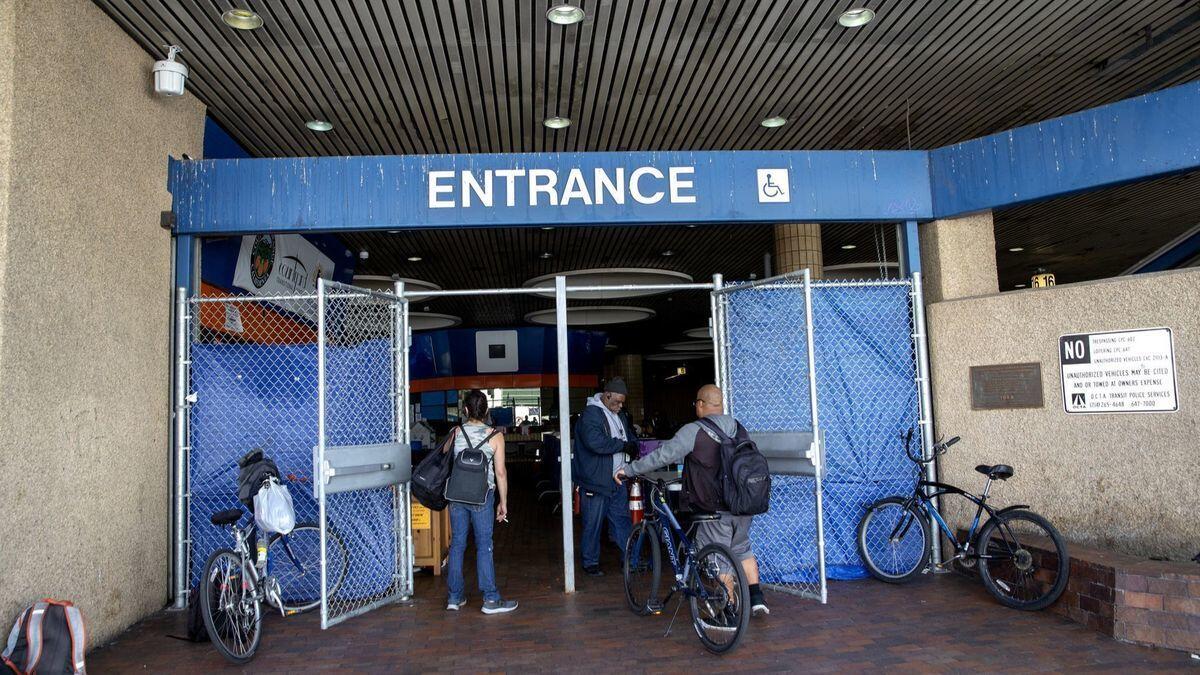Orange County says many of the allegations in ACLU’s report on homeless shelters cannot be verified

- Share via
Many of the findings in an American Civil Liberties Union report highly critical of Orange County-run homeless shelters could not be independently verified — or outright dismissed — according to a letter from the county counsel reviewed Tuesday by the Board of Supervisors.
The nine-page letter, signed by County Counsel Leon Page, claims county staffers and contracted service providers were unable to either verify — or refute — all of the ACLU’s claims of neglect, physical and sexual abuse, unsanitary conditions and lack of accountability at the shelters because so many of the allegations came from anonymous sources.
“The county believes the complaints contained in the report are unfounded, have already been remedied by the county, or are in the process of being remedied,” Page wrote.
ACLU attorneys Eve Garrow and Julia Devanthéry said they remain confident in the report, the result of a year-long investigation and interviews with more than 70 people who live, volunteer and work at three county-operated shelters.
“The county believes that some of the complaints are unfounded but they provide no evidence or explanation for that assertion,” Garrow said. “Since the report was released we’ve received many more complaints from the people living in these shelters. If anything, from our perspective, we’ve still little to no progress and in some ways, conditions have gotten worse.”
The conditions of the bathrooms in the shelters, for example, are particularly poor, according to the ACLU report, which was issued in March.
However, Page countered in his letter that the shelters employ janitors daily for routine cleaning and maintenance, portable toilets are serviced twice daily, and county staffers routinely investigate the facilities.
But Garrow countered that the Courtyard shelter in downtown Santa Ana, for example, has eight portable toilets instead of the required 43 for the 430 people who sleep there nightly.
“We believe that we are in compliance with all applicable laws as it relates to the number of portable toilets at the Courtyard,” county spokeswoman Molly Nicholson said Friday.
Since the publication of the ACLU’s report, Courtyard residents have told attorneys the toilet shortage continues to result in unsanitary conditions, Garrow said.
Shelter residents also reported showers without hot water and the lack of soap at hand-washing stations in the bathrooms.
“We don’t understand what the county means when the county says we have health and safety standards,” Garrow said. “It’s totally unacceptable for residents to take cold showers. It’s totally unacceptable to not be able to wash your hands after you go to the bathroom.”
The original ACLU report, painted a dark picture of the facilities.
“People who have been to jail have said jail is better than this shelter,” one homeless resident, Roberta Filicko, wrote in her diary, according to the report. “We are so scared that we will be living on the streets, and the staff make sure to remind you of this every minute of every day. It’s true we have no one to help us, so we go along with it.”
An employee at one of the Santa Ana emergency homeless shelters found that bedbugs would crawl on you if you sat down long enough, according to a Los Angeles Times story on the claims, and one resident called an emergency shelter in Anaheim “one of the filthiest shelters I have been in.”
The county recently closed escrow on a new site to relocate the Courtyard to a more appropriate facility that includes laundry, showers and toilets with plumbing, Page wrote.
“Operating a shelter within the Santa Ana Bus Terminal was known from the beginning to have its challenges, however, considering it was the response to a crisis, most would agree that it represents an improvement to unregulated camping in the Civic Center Plaza,” he wrote.
Another topic of disagreement between the county and ACLU is the ban on photography, videography and audio recording inside county-operated shelters.
“It’s important for residents who use these facilities to document the conditions at these facilities and document staff misconduct,” Garrow said.
Page argued that this is necessary to protect the privacy and confidentiality of those living at the shelter.
County officials reiterated that that they have a zero tolerance policy with regard to discrimination and abuse of residents or employees, saying “staff maintain a professional and ethical standard of conduct.”
“No County government in California has accomplished more, especially in such a short period of time,” Page wrote.
This article contains reporting and writing from a March 14 story by Times staff writer Jaclyn Cosgrove.
Daniel Langhorne is a contributor to TimesOC.
For more news and features about Orange County, visit TimesOC.com or follow us on Twitter @timesocofficial.
All the latest on Orange County from Orange County.
Get our free TimesOC newsletter.
You may occasionally receive promotional content from the Daily Pilot.




